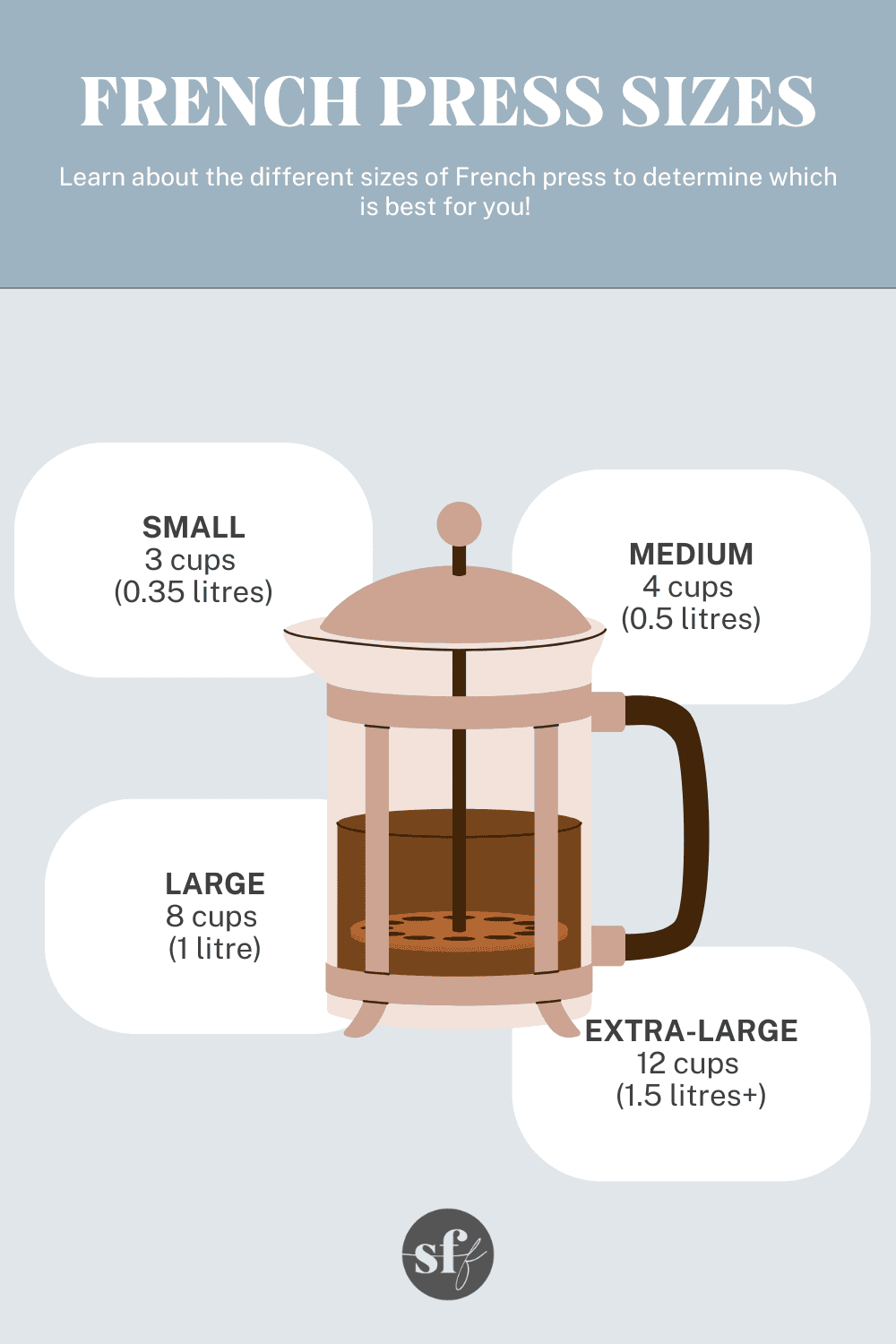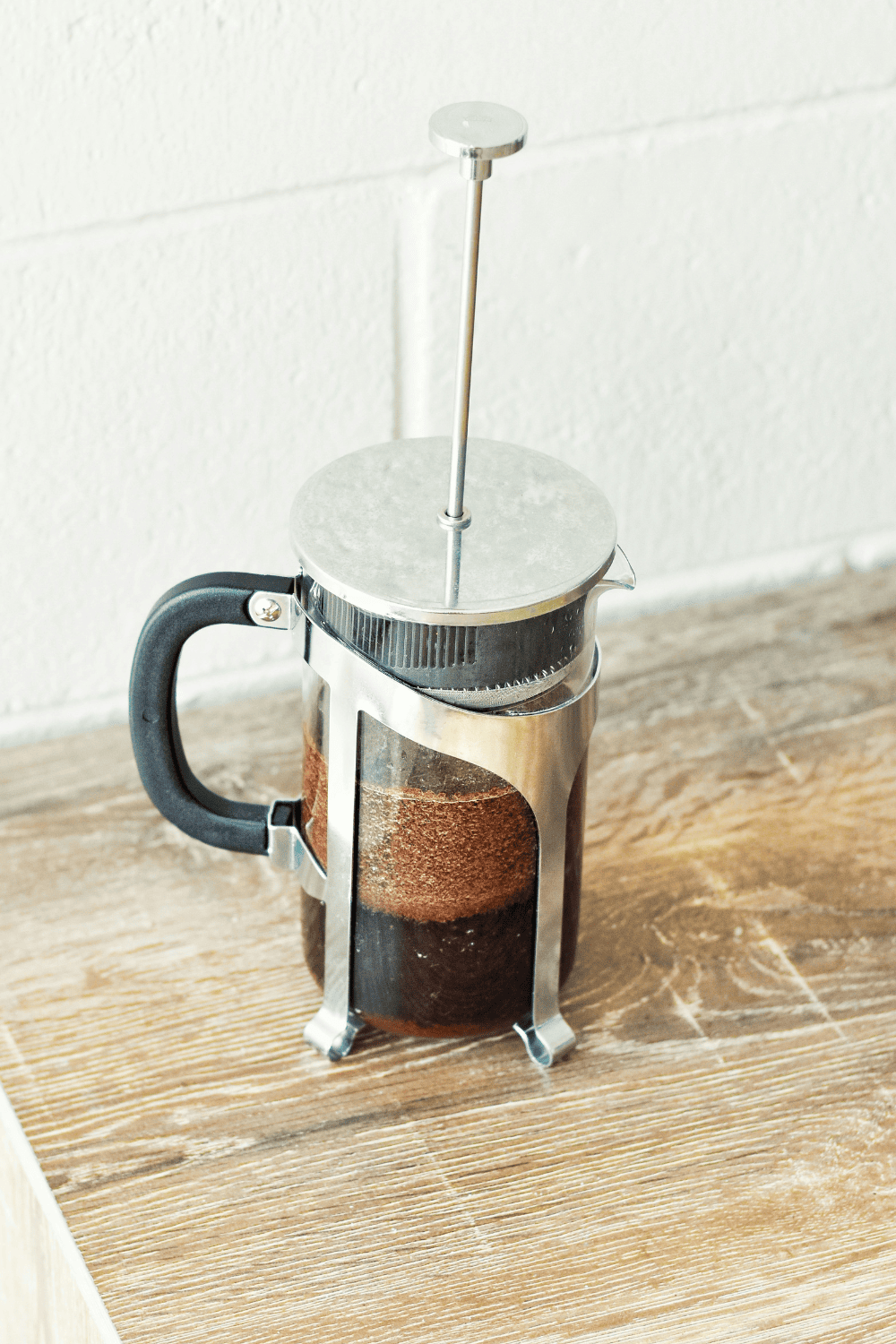Learn about the different sizes of French press to determine which is best for you!
French press coffee brewing is a great method for making delicious coffee at home. French Presses are easy to use, don't require paper filters, and consistently make a great cup of coffee to perk you up every day.
But if you're on the lookout for different brands of French press, you've probably found there are a whole bunch of sizes to choose from. This helpful guide to French press sizes will help you decide which is the best for you and your household. Read on for a closer look at how different sizes impact your coffee brew and how to pick the right French press size for you.
What are the different French press sizes?

As with all coffee brewing styles, French press coffee makers come in many sizes. These different sizes primarily impact how much coffee you can make per brew, but there are also plenty of other factors to consider. Here are the standard sizes of French presses on the market and how many cups of coffee they're ideal for brewing.
Importantly, most French press manufacturers consider 4 ounces of coffee (or just about 120 mL) to be a single cup size. This is less than half the size of a standard-size cup (250 mL) and usually won't fill a large mug to the top. So, unless you and your household are very light coffee drinkers, it's a good idea to start from a minimum of two cups per person, per brew.
Small: 3 cups (0.35 litres)
Compact and easy to store, a small French press is a great choice for a solo coffee drinker looking to make a quick cup or two on the go. Small French presses are easy to clean and can be stored on the countertops or in cupboards - even in small kitchens.
Smaller French presses also mean you're using smaller amounts of coffee grounds, which are easy to dispose of.
Just be aware that the coffee brewed in a small French press can lose heat quite quickly so it should be enjoyed soon after brewing. If you're expecting a guest for coffee, a small French press can be perfect for a small cup of coffee each, although a medium size is usually the better choice if you're making coffee for more than one person.
Medium: 4 cups (0.5 litres)
Medium-sized French presses are a great choice for couples and solo coffee drinkers, especially those who enjoy several cups of coffee in a single brew. Like small French presses, this size is compact enough to store away just about anywhere and easy to keep clean. One area in which medium French presses outshine their smaller counterparts lies in the volume they brew. Unlike small French presses which really only make enough coffee for one, the medium size is better for those who occasionally need to make an extra cup.
Large: 8 cups (1 litre)
An 8-cup French press is one of the most popular sizes of household French press. This option is easily large enough to brew a batch of morning coffee for four but not too large for an individual or couple to appropriately use and store it. Coffee brewed in a 1-litre French press will stay warmer for longer, so if you like to drink several cups across the morning, this is your best bet.
Extra-large: 12 cups (1.5 litres and up)
Extra-large French presses are with a capacity of 12 cups or more. These are perfect for households with a large family, or for when you're entertaining guests.
Extra-large French presses can be a bit more of a storage space investment, however, as you'll need to have the room on your countertop or in your cupboard to keep it.
This size of French press is less practical for individuals or couples to use daily, but even the largest French press can easily be brewed at half-measure to make an appropriate number of cups.
How does French press size impact coffee brewing?
Size doesn't just matter when it comes to volume - it also impacts your brewing processes. Everything from the coffee-to-water ratio to extraction time will vary, depending on how big your French press is.
Coffee-water ratio
A good rule of thumb to follow when figuring out the coffee-to-water ratio is 1-2 grams of coffee per 15 mL of water. This means that you'll want to use about 1 tablespoon per 'cup' as labeled on your French press. Of course, you can use more or less ground coffee per cup, based on your taste preferences.
The key difference between brewing coffee in a small French press or a large French press is the precision required to get this coffee-water ratio right. In a smaller French press, you have significantly less margin for variation before your coffee becomes too acidic, strong, or over-extracted.
On the other hand, larger French presses are generally more forgiving and easier to make a tasty brew, as they hold much more hot water. Larger French presses also allow for a more balanced brew, as more water comes into contact with coffee grounds, resulting in a more even extraction.
Brewing time
Another important factor to account for is the time it takes to brew and extract the coffee in your French press. Brew time is impacted by a wide range of factors, from the temperature of the water to your taste preferences to how coarse or fine the coffee grind is. As with the coffee-water ratio, smaller French presses have a smaller time margin before the extraction becomes too bitter or strong.
If you're using a smaller French press, you'll have to keep a close eye on the brewing process, starting at about 3 minutes for a 3-cup French press.
In contrast, larger French presses require more time to brew coffee. A 12-cup French press takes at least 5 minutes to extract a full-bodied brew. This wider timeframe gives you more room to experiment with extraction time so that you can make a mug of coffee that perfectly suits your taste.
Extraction consistency
Different sizes of French press have different requirements for getting an even extraction and making a tasty batch of coffee. When using a smaller French press, it's much easier to over-extract or under-extract your coffee based on whether you have fine or coarse grounds. This can lead to bitter or sour coffee, which isn't pleasant for anyone!
This means that if you're considering getting a smaller French press, you'll need to do a bit of research and experimenting to find the right grind size and brew time to suit your preferences.
Larger French presses are generally more forgiving when it comes to extraction consistency. This is because more water is used to brew the coffee, and the longer brewing time means it's easier to adjust a minute here or there for different grind sizes. With finer coffee, you generally want a shorter brewing time, while a coarse grind size may need a minute or two longer.
Tips for picking the best French press size for you
It might seem like there's a lot that goes into picking the right size of French press for home use. But to get started, here are some simple things to consider about your own coffee-drinking habits, household and kitchen setup.
- Coffee consumption: Consider how much coffee you and your household like to drink. If you like to drink multiple cups, a larger French press will save you time and effort.
- Space: If your kitchen space is limited, a smaller French press will fit better in tight spaces. Larger presses have a larger brewing capacity but take up more room for storage and cleaning.
- Ease of use: While French press coffee is an easy brew method, smaller French presses generally require more precision, research, and experimentation to make a flavourful cup of coffee. This makes smaller French presses great for coffee enthusiasts, while larger French presses may make it easier for casual coffee drinkers to make great coffee.
Our top picks for French presses:




- Bodum Chambord French Press Chrome, 1.0L - 8 Cup Capacity Chrome
- La Cafetière Pisa 8-Cup Stainless Steel/Glass Coffee French Press
- La Cafetière Pisa Cafetiere 8 Cup 1.0L Copper Coffee French Press
- Maxwell & Williams Blend Vienna Double Wall Plunger 350ML Clear
- Baccarat Barista Brillante Double Wall Coffee Press 1L Black Mesh
Love espresso too? Try this iced shaken espresso recipe!

Share Your Thoughts